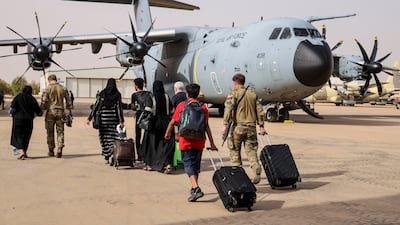An 85-year-old British man was shot and his wife died of starvation after they were left behind during the evacuation of UK nationals from Sudan.
Repeated calls for help by the family of Abdalla Sholgami and his wife Alaweya Rishwan, 80, went unanswered, according to an investigation by BBC Arabic.
The couple, who were visiting Sudan, were told they would not receive any assistance and would have to cross the war zone to board the British evacuation flight.
Mr Sholgami, a London hotel owner, eventually had to leave the house, which was next door to the British embassy, in search of food and water. He was shot three times and taken to a hospital in another area of Khartoum for treatment.
The house was surrounded by snipers, so the family could not reach Ms Rishwan, who suffered from a disability. She was found dead of starvation days later by an employee of the Turkish embassy.
Their granddaughter told the BBC: “One of the diplomats in the Turkish embassy [said] I am sorry to tell you this but we went inside and your grandmother passed away.”
She said the house was a “maximum of four steps” from the British embassy.
“It just breaks my heart to think she died alone,” she said. “And she died because she was alone. And she is still alone to this very moment. And she might be buried alone, with none of her family members around her.”
Mr Sholgami has since escaped Sudan to safety in Egypt.
The Foreign Office told the BBC the case was “extremely sad”.
“The continuing military conflict means Sudan remains dangerous,” a spokesman said.
“The UK is taking a leading role in the diplomatic efforts to secure peace in Sudan.”
The Foreign Office said the ability to provide consular assistance is “extremely limited” and cannot provide in-person support in Sudan.
The crisis in Sudan - in pictures
More than 2,300 people were evacuated by the UK Government from Sudan on 28 flights after fighting began in April.
The fighting between Sudan's military and a powerful paramilitary force has displaced more than 1.3 million people, the UN migration agency said on Wednesday.
The International Organisation for Migration said the clashes have forced more than a million people to leave their homes to safer areas inside Sudan.
About 320,000 others have fled to the neighbouring countries of Egypt, South Sudan, Chad, Ethiopia, the Central African Republic and Libya.
The fighting started on April 15 after months of escalating tensions between the military, led by Gen Abdel Fattah Al Burhan, and the Rapid Support Forces commanded by Gen Mohamed Dagalo.
A week-long ceasefire to allow aid deliveries has been in place since Monday night and has largely held, despite reports of heavy clashes in cities including the capital.
The truce, brokered by the US and Saudi Arabia in talks in Jeddah, includes a monitoring mechanism involving the army and the RSF, as well as representatives from Washington and Riyadh.
This week, Annette Weber, EU envoy to the Horn of Africa, told The National that Sudan’s warring sides must consolidate the current ceasefire and allow for immediate humanitarian access, with the backing of a united African front.
“It is clear that we need an African component, we need the African Union to take the lead on this issue,” Ms Weber said during a visit to Abu Dhabi.
Ms Weber said the EU fully supported the idea of an African lead orchestrating a political and humanitarian solution to the crisis with a “task force that encompasses the League of Arab States, the EU, the Quad [the US, UK, Saudi Arabia and the UAE]".
“If there is a strong negotiator then it would be in our interest to have the African lead and to have someone to bridge the Arab-African composition of Sudan,” she said.












